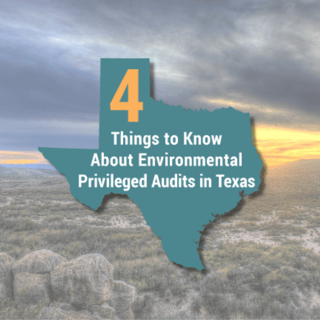- Home
- Services
- Hi-Line Engineering
- About
- Careers
- Contact
- Requests For Proposals
4 Things to Know About Environmental Privileged Audits in Texas
by GDS Associates, Inc | September 23, 2021 | Environment & Safety
If properly followed, The Texas Environmental, Health,
and Safety Audit Privilege Act (Audit Act)1 can save you and your business time, monies, and stress that could come from noncompliance with environmental regulations. Below are 4 key points that could help you decide whether a “Privileged Audit” is necessary for your situation.
1. You can gain immunity from penalties
As stated in Texas Health and Safety Code §1101.151, pertaining to the Audit Act, “…a person who makes a voluntary disclosure of a violation of an environmental or health and safety law is immune from an administrative or civil penalty for the violation disclosed.” Given that notice requirements are met, violations discovered during a privileged audit and subsequently disclosed to the Texas Commission on Environmental Quality (TCEQ) are immune from these penalties. Two caveats, 1) immunity does not apply to violations that resulted in injury to a person on-site or caused off-site harm and 2) immunity may be denied from facilities with a history of disregard for environmental laws.
2. Notice requirements must be met
Notice of Audit (NOA): An NOA must be submitted via certified
mail to the agency prior to beginning privileged audit activities.
The NOA must outline the who, what, where, when, and why of
the proposed audit. An NOA is only required for an audit conducted under the Audit Act. From the submittal date of the
NOA, a person must complete the audit and any corrective action within “a reasonable amount of time” (6 months) before
having to submit a Request for Extension to continue the audit.
Disclosure of Violation (DOV): Following discovery of a violation during the audit, a DOV must be submitted via certified mail to the agency, stating the who, what, where, when, and how of each violation. The how concerns how the violation will be corrected, if not already corrected by the submittal date of the DOV, and the when concerns the corrective action schedule of each disclosed violation. No information within the DOV can be claimed as confidential or the DOV will be returned.
Request for Extension: A Request for Extension with information justifying the request must be submitted via certified mail if the audit (including corrective action) will exceed 6 months. As a side note, privileged audits conducted for facility acquisition purposes are subject to a variation of the above notice requirements.
3. Immunity does not apply to known violations
A privileged audit cannot be used to provide immunity for a known noncompliance/violation. In other words, if the persons involved with an audit acknowledge that there is a known violation prior to submitting the NOA, that violation will not be immune from penalties.
4. Specific to Texas; EPA has its own “Privileged Audit”
The United States Environmental Protection Agency (EPA) has its own version of the Audit Act entitled “Incentives for Self-Policing: Discovery, Disclosure, Correction, and Prevention of Violations – Final Policy Statement.” Therefore, the Audit Act is Texas-specific
and does not apply to federal agencies.
For more information, the Texas Commission on Environmental Quality (TCEQ) has created a detailed guidance document (RG-173) for the Audit Act that can help you decide if a privileged audit is right for you and your operations.
1 Tex. Health & Safety Code §1101 (2017)
Questions?
 Contact Jack Simmons, P.G.
Contact Jack Simmons, P.G.
in our Austin, Texas office at
512.541.3131 or
jack.simmons@gdsassociates.com
GET OUR NEWSLETTER
RECENT POSTS
- Protect the Grid: Act on Facility Ratings Today
- Why MOD-026-2 Matters: Raising the Bar for Generator and IBR Modeling Reliability
- Exploring the 2026-2028 Reliability Standards Development Plan
- Blackstart Resource Availability During Extreme Cold Weather Conditions
- DOE Pushes FERC to Accelerate Large Load Grid Access
Archives
- December 2015 (8)
- June 2025 (7)
- January 2016 (6)
- July 2016 (6)
- March 2021 (6)
- May 2022 (6)
- August 2020 (5)
- March 2015 (4)
- January 2019 (4)
- June 2019 (4)
- August 2019 (4)
- February 2020 (4)
- May 2020 (4)
- June 2020 (4)
- December 2020 (4)
- July 2021 (4)
- October 2021 (4)
- April 2024 (4)
- December 2024 (4)
- May 2025 (4)
- April 2015 (3)
- August 2016 (3)
- February 2017 (3)
- July 2017 (3)
- February 2018 (3)
- February 2019 (3)
- November 2019 (3)
- March 2020 (3)
- April 2020 (3)
- September 2021 (3)
- December 2021 (3)
- August 2022 (3)
- December 2022 (3)
- April 2023 (3)
- July 2023 (3)
- December 2023 (3)
- September 2024 (3)
- October 2025 (3)
- December 2025 (3)
- May 2014 (2)
- February 2016 (2)
- March 2016 (2)
- September 2016 (2)
- November 2016 (2)
- January 2017 (2)
- July 2018 (2)
- November 2018 (2)
- March 2019 (2)
- May 2019 (2)
- July 2020 (2)
- September 2020 (2)
- April 2021 (2)
- August 2021 (2)
- October 2024 (2)
- September 2025 (2)
- February 2014 (1)
- April 2014 (1)
- July 2014 (1)
- August 2014 (1)
- November 2014 (1)
- February 2015 (1)
- May 2015 (1)
- June 2015 (1)
- November 2015 (1)
- October 2016 (1)
- December 2016 (1)
- October 2018 (1)
- December 2018 (1)
- April 2019 (1)
- July 2019 (1)
- September 2019 (1)
- October 2020 (1)
- November 2020 (1)
- February 2021 (1)
- April 2022 (1)
- July 2022 (1)
- October 2022 (1)
- August 2023 (1)
- October 2023 (1)
- July 2025 (1)
- November 2025 (1)
- January 2026 (1)
Categories
- Newsletter - TransActions (85)
- News (78)
- Employee Spotlight (35)
- Energy Use & Efficiency (28)
- Energy, Reliability, and Security (18)
- Other Specialized Services (11)
- Environment & Safety (10)
- Power Supply (8)
- Transmission (8)
- NERC (7)
- Utility Rates (7)
- Cyber Security (5)
- Energy Supply (4)
- Hi-Line: Utility Distribution Services (4)
- Battery Energy Storage (3)
- Uncategorized (2)
- Agriculture (1)
- Hi-Line: Seminars & Testing (1)